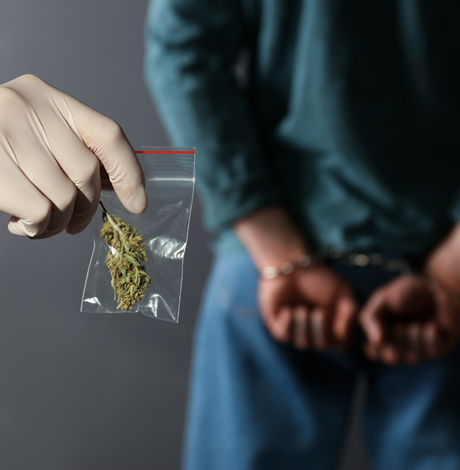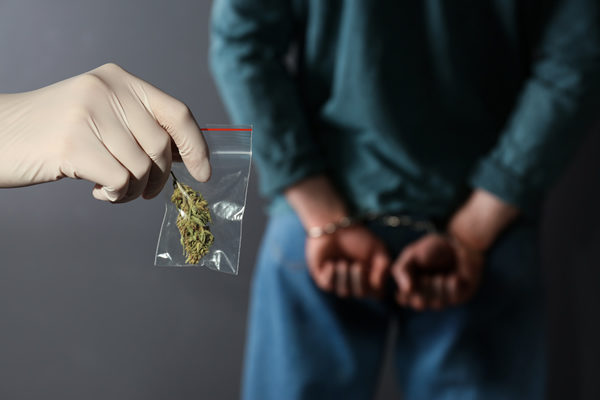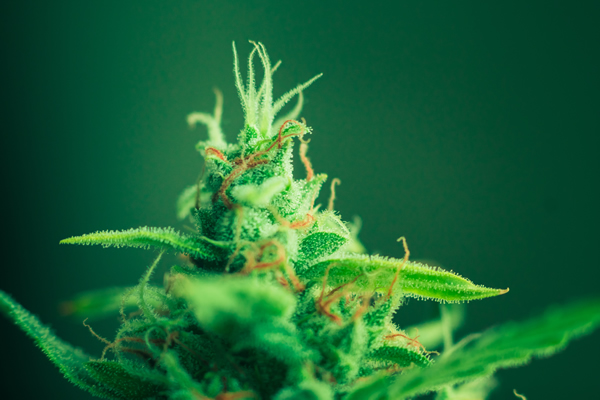Cannabis Culture
Cannabis Culture
Marijuana arrests rise for 3rd year in row


Marijuana arrests rise for 3rd year in row
The total number of persons arrested in the United States for violating marijuana laws rose for the third consecutive year, according to data released by the FBI.
According to the FBI’s Uniform Crime Report, police made 663,367 arrests for marijuana-related violations in 2018. That is more than 21 percent higher than the total number of persons arrested for the commission of violent crimes (521,103). Of those arrested for cannabis-related activities, some 90 percent (608,776) were arrested for marijuana possession offenses only.
“Police across America make a marijuana-related arrest every 48 seconds,” NORML Executive Director Erik Altieri said. “At a time when the overwhelming majority of Americans want cannabis to be legal and regulated, it is an outrage that many police departments across the country continue to waste tax dollars and limited law enforcement resources on arresting otherwise law-abiding citizens for simple marijuana possession.”
The year-over-year increase in marijuana arrests comes at the same time that several states, including California, have legalized the adult use of cannabis — leading to a significant decline in marijuana-related arrests in those jurisdictions. It also marks the reversal of a trend of declining arrests that began following the year 2007, when police made a record 872,721 total marijuana-related arrests in the United States.
Marijuana-related arrests were least likely to occur in western states — most of which have legalized the substance — and were more prevalent in the northeast, where they constituted 53 percent of all drug arrests.
California voters say legalizing pot ‘a good thing’
BERKELEY, Calif. — Nearly seven out of 10 registered voters in California believe that the passage of Proposition 64, which legalized the adult use and retail sale of cannabis, was a “good thing,” according to polling data compiled by the University of California at Berkeley’s Institute for Governmental Studies.
Sixty-eight percent of respondents endorsed the law, while only 30 percent said that it was a “bad thing.” Those respondents between the ages of 30 and 39 (81 percent), between the ages of 18 and 29 (79 percent), and self-identified Democrats (78 percent) expressed the greatest degree of support for the law. By contrast, 50 percent of Republicans defined the law as a “bad thing.”
Proposition 64 was passed by voters in 2016 by a vote of 56 percent to 44 percent.
Sixty-three percent of respondents also said that they favored allowing retail marijuana stores to operate in their community. That result is largely in contrast with local laws, as the majority of California’s cities and counties prohibit commercial marijuana activities.
Pollsters surveyed over 4,500 registered voters. The poll possesses a margin of error of +/-2 percentage points.
Unregulated THC vapor cartridges often contain dangerous additives
LOS ANGELES — Unregulated THC vapor cartridges often contain vitamin E oil, according to a recent investigation by NBC News.
The inhalation of vitamin E oil, which is sometimes added to unregulated e-liquid products in an effort to thicken their consistency and to mask dilution, has previously been linked with incidences of lipoid pneumonia. An advisory issued last month by New York State health officials identified “very high levels of vitamin E acetate in nearly all cannabis-containing [vapor cartridge] samples analyzed.”
The NBC News investigation reported that 87 percent of the unregulated THC cartridges they analyzed tested positive for the presence of vitamin E oil. Many of the products also tested positive for the presence of pesticides. By contrast, “Of the three purchased from legal dispensaries in California, the CannaSafe testing company found no heavy metals, pesticides or residual solvents like vitamin E.”
Updated data released last week by the U.S. Centers for Disease Control reported more than 800 cases of acute respiratory distress linked to the use of portable vapor cartridges used to consume e-liquids. Of the products tested thus far by the U.S. Food and Drug Administration, about half have identified the presence of vitamin E acetate. Most of the products linked to lung illnesses have been traced to the unregulated, “informal” market, the agency reported.
These findings reaffirm the variance in the safety and the quality of cannabis-related products available on the unregulated market versus those on the state-regulated retail market, NORML Deputy Director Paul Armentano said. “Consumers must also be aware that not all products are created equal; quality control testing is critical and only exists in the legally regulated marketplace.”
In recent days, lawmakers in Michigan, New York, Rhode Island, and Washington have moved to impose bans on the sale of flavored vaping and/or e-cigarette products, while the Governor of Massachusetts has enacted a temporary ban on the retail sale of all vaping products, including the sale of state-regulated products at licensed cannabis dispensaries. Oregon’s Governor is considering implementing a similar emergency ban.
Cannabis Culture news in the Blade is provided in partnership with NORML. For more information, visit norml.org.

Democratic Gov. Michelle Lujan Grisham earlier this month signed two separate measures into law amending the state’s marijuana policies. The first measure (House Bill 2) legalizes and regulates marijuana possession, production, and sales for adults. The second measure (Senate Bill 2) facilitates the automatic review and expungement of the records of those convicted of low-level marijuana offenses.
Lawmakers approved both bills during a special legislative session demanded by Gov. Lujan Grisham, who had been a vocal proponent of the reforms.
NORML State Policies Manager Carly Wolf said: “This is a day to celebrate! New Mexico will greatly benefit from this new revenue stream and the creation of thousands of jobs. Most notably though, legalization will spare thousands of otherwise law-abiding residents from arrest and a criminal record, and the state’s new expungement law will help provide relief to many who are suffering from the stigma and other collateral consequences associated with a prior marijuana conviction.”
The adult-use measure (House Bill 2) permits those ages 21 and older to legally purchase up to two ounces of marijuana and/or up to 16 grams of cannabis extract from licensed retailers. It also permits adults to home-cultivate up to six mature plants for their own personal use. Retail sales would begin by April 2022.
The expungement measure (Senate Bill 2) stipulates that those with past convictions for offenses made legal under this act are eligible for automatic expungement of their records. Those currently incarcerated for such offenses are eligible for a dismissal of their sentence. It’s estimated that over 150,000 New Mexico residents are eligible for automatic expungement under this measure, according to the Department of Public Safety.
Cannabis Culture news in the Blade is provided in partnership with NORML. Visit norml.org for more information.
Cannabis Culture
Delaware cannabis activists take on corporate marijuana
Criticism from medical marijuana operators claimed that HB150 offers too many cultivation and retail licenses

As the country moves forward with sweeping changes in cannabis policy reform, locals in Delaware are tangling with corporate, multi-state medical marijuana permit holders to pass a bill for full legalization.
Adult-use activists and registered medical patients were stunned to hear opposing testimony from Delaware’s medical marijuana operators. Patients already deal with limited access and costly products. Now, many see the established industry voicing opposition as simply obstructing the progress of adult-use legislation. In response, some patients are now staging a boycott of the regulated dispensaries.
During the first committee hearing for HB150, Delaware’s adult-use bill, four of the state’s six currently licensed, multi-million dollar medical cannabis facilities offered negative testimony.
Zoë Patchell, executive director of Delaware CAN responded: “This market belongs to the long-time consumers, patients, and activists. We create the demand, we’ve been the ones driving the reform efforts, and we pay the prices at dispensaries. Cannabis is more than a market – cannabis is a community. These companies cannot reasonably fathom that we are going to purchase cannabis from any entity that has proven to put profits over patients. And now they seem willing to put consumers’ lives and freedom at risk just to hold out for an unfair advantage in the industry.”
These included publicly traded Columbia Care, “Fresh Delaware” aka CCRI, CannTech Research Inc., and the owner of EZY Venture aka “The Farm.”
They all went on record condemning HB150, and pushing a false narrative about oversupply. The core demand from the permit cartel was some protection for their private business interests with guaranteed adult-use licenses.
Criticism from the medical marijuana operators claimed that HB150 offers too many new cultivation and retail licenses, underlined by deep yet unfounded fears that the new competition would put their companies out of business.
Patchell noted, “We are not going to sit back while multi-state corporate entities, that already monopolize East Coast medical markets, work to undermine our social equity and micro-license provisions.”
Cannabis Culture news in the Blade is provided in partnership with NORML. Visit norml.org for more information.
Cannabis Culture
Virginia marijuana legalization takes effect July 1
Adult possession of cannabis up to one ounce without penalty

Following legislative approval of Democratic Gov. Ralph Northam’s amendments to Senate Bill 1406 and House Bill 2312, Virginia became the first southern state to legalize the possession and use of marijuana by adults.
Senate Bill 1406, introduced by Sen. Adam Ebbin (D-30) and Senate President Pro Tempore Senator Louise Lucas (D-18), and House Bill 2312, patroned by House Majority Leader Delegate Charniele Herring (D-46), establish a statutory timeline for the legalization of the commercial marijuana market in Virginia. The measure also permits for the personal possession and cultivation of cannabis by those ages 21 or older.
Last week, Gov. Northam recommended changes to the legislation to permit the personal use provisions of the law to take effect on July 1, 2021 rather than on January 1, 2024, the enactment date initially approved by lawmakers. A majority of the legislature concurred with that change.
Therefore, beginning July 1, 2021, adults will be permitted to possess up to one ounce of marijuana and to cultivate up to four cannabis plants per household without penalty.
The timeline by which state regulators have to enact provisions licensing commercial cannabis production and sales remains July 1, 2024.
Commenting on final passage, NORML Development Director Jenn Michelle Pedini, who also serves as executive director of Virginia NORML, said: “This is an incredible victory for Virginia. Legalization will bring an end to the thousands of low-level marijuana infractions occurring annually in the Commonwealth — ending a discriminatory practice that far too often targets Virginians who are young, poor, and people of color.”
Majority Leader Charniele Herring added: “It is a huge day for equity in the Commonwealth. Virginia is now the first state in the South to legalize recreational marijuana use, and I am so proud to have been able to carry this monumental legislation.”
Sen. Ebbin said, “The passage of SB1406 caps off years of struggle to reform our broken and outdated marijuana laws and begins the deliberate steps to repeal the harms of the failed prohibition. I am thankful to NORML, the governor, and my colleagues for moving this 283 bill from inception to passage over the last four months, and look forward to continuing to partner with them to establish a regulated, equity focused, adult-use marketplace in the coming years.”
Newly released statewide polling data finds that 68 percent of registered voters in Virginia, including majorities of Democrats and Republicans, support legalizing marijuana for adults.
Additional amendments added by Gov. Northam will allow the sealing of records related to crimes involving the misdemeanor possession of marijuana with the intent to distribute. Those records will begin to be sealed starting on July 1, 2021. Separate legislation enacted in 2020 previously sealed records related to misdemeanor marijuana possession.
Records specific to the simple possession of marijuana and/or misdemeanor possession with intent to distribute records will be automatically expunged no later than 2025. Those with records specific to crimes involving the felony possession of marijuana with the intent to distribute may begin to petition the courts for an expounging of their records in 2025.
The bill also allows for the re-sentencing of individuals currently incarcerated for marijuana-related offenses. The measure permits those individuals to have a hearing before the court that originally sentenced them, with legal counsel provided for indigent individuals. However, this portion of the bill must be reenacted in 2022.
The legislation also establishes an independent agency, the Virginia Cannabis Control Authority, to oversee the establishment of regulations that will govern the adult-use market. This agency is set to convene this summer. The remainder of the 300-page bill, which details the regulatory and market structure and social equity provisions, is subject to a second review and vote by the Assembly next year.
Cannabis Culture news in the Blade is provided in partnership with NORML. Visit norml.org for more information.
-

 U.S. Supreme Court4 days ago
U.S. Supreme Court4 days agoSupreme Court to consider bans on trans athletes in school sports
-

 Out & About4 days ago
Out & About4 days agoCelebrate the Fourth of July the gay way!
-

 Virginia4 days ago
Virginia4 days agoVa. court allows conversion therapy despite law banning it
-

 Opinions5 days ago
Opinions5 days agoCan we still celebrate Fourth of July this year?











